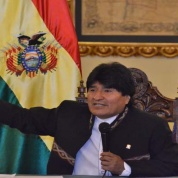Can Historical Records Help Bolivia Win Back Access to the Sea?
October 19, 2015 - telesurtv.net
 Tucked away in a side entrance at Bolivia's Foreign Office is the nondescript archives department. Its bland gray exterior gives no hint of the important work staff have been carrying out on behalf of the government.
Tucked away in a side entrance at Bolivia's Foreign Office is the nondescript archives department. Its bland gray exterior gives no hint of the important work staff have been carrying out on behalf of the government.
President Morales says historical records will prove Bolivia has a case
Staff have been busy sorting through thousands of official documents and historical records, to be more precise, 136 years worth of diplomacy between Bolivia and Chile, looking for historical evidence to prove the nation has a legal right to the pacific ocean.
Complicating their work is the fact that some documents are in so a fragile state they can not be handled for long or removed from their temperature-controlled rooms.
Some records on the conflict date back as far as the 1870s. They detail the diplomatic negotiations that have taken place between Chile and Bolivia since it lost the war of the pacific in 1884.
"There's so much here," says Raquel Lara, from the Central Archives Department. "We have memorandums, reports, documents and diplomatic correspondence between Chile and Bolivia from a century ago."
And the aim? "To demonstrate that if Bolivia had the sea once, we can show the world that this maritime claim is justified," she says.
Such is the huge public appetite for information on this ongoing dispute, the government decided to open up some non-sensitive records to the public for one day last week.
Bolivia is keen to show the world that there is evidence to support its case against Chile to regain its lost coastline.
The International Court of Justice ruled last month it will continue hearing Bolivia's case to force its neighbor to enter negotiations to grant it a corridor to the Pacific.
Bolivians said it was a day they would never forget, but Chile claimed Bolivia "had won nothing."
Since then, diplomatic relations have deteriorated.
"So far this conflict about how to re-construct the diplomatic relationship between Bolivia and Chile has reached ground zero," political analyst Franco Gamboa told teleSUR English. "So far all the ICJ decision has resulted in is helping President Evo Moralaes with his re-election campaign"
The rhetoric between the two countries has deteriorated rather than improve since The Hague ruling.
Chile responded by declaring that Bolivia had "won nothing." At one stage Chile indicated that it was was willing to negotiate "better access to the sea" for Bolivia.
However, President Evo Morales said that when his government followed up on the proposal they found it was a "mamada" — a Bolivian expression meaning a deception or lie, which could also be translated as "bullshit."
Every day in Bolivia brings a new twist in the ongoing diplomatic wranglings with Chile.
Bolivia's Vice president Alvaro Garcia Linera says Bolivia is only asking Chile for justice in its pursuit of sovereign access to the Pacific.
"We demand justice, integration and common welfare and who in the world can stand against that?" he said at a press conference.
Garcia Linera says the Hague ruling was the first victory for Bolivia after 136 years of diplomacy, claiming Bolivia won in "legal and moral terms."
Chile begs to differ and with strong public support against relinquishing any of its coast line to Bolivia, President Michele Batchelet is in no hurry to start talks with her neighbors.
Bolivia and Chile have not had full diplomatic relations since the 1970s.
And with both sides claiming they have legitimate rights to the Pacific, it could be several years before the impasse is finally resolved, with or without a ruling from the ICJ.